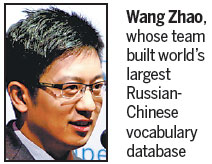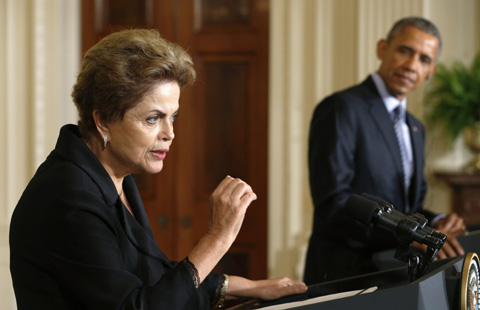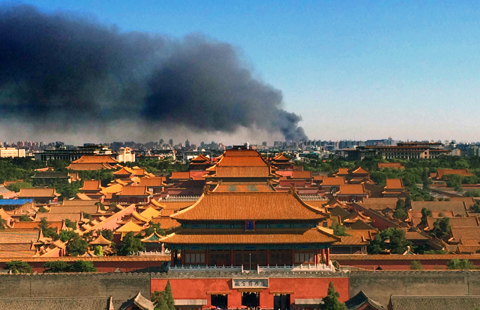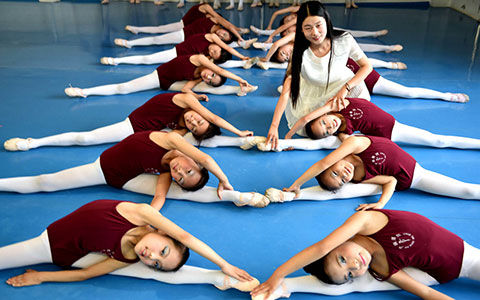Startup fills need for translation with Yi-Pad
Updated: 2015-07-01 07:36
By Xie Chuanjiao in Qingdao, Shandong(China Daily)
|
||||||||
Russian-Chinese e-dictionary proves a big hit across borders
President Vladimir Putin of Russia may have a high-tech gift in his future from a Chinese entrepreneur.
"I hope one day I can present a Yi-Pad as a gift to President Putin," said Wang Zhao, who recently told China Daily of his desire to share one of his company's Russian-Chinese e-dictionary tablets.
Wang, founder and CEO of Qingdao Aurora Borealis Network Technology Co, made the remarks at the recent Sino-Russia Industrial Forum, where he was a representative of startup entrepreneurs.
The 32-year-old and his team spent six years building the world's largest Russian-Chinese vocabulary database and online dictionary portal, Yicool.com, which has more than 20 million entries.
In addition, the company has launched a number of language-aid electronics products, including the Yi-Pad.
By the end of last year, company assets had climbed to 40 million yuan ($6.4 million). It is now the brightest star among the startups in the coastal city of Qingdao.
Russian Ambassador to China Andrey Denisov, who has worked with the Yi-Pad, sent a letter to Wang and his team in recognition of their work.
"Thank you for your unfaltering efforts in promoting the Russian language in China and facilitating the cultural exchange between Russia and China," Denisov wrote.
Wang's success story began in 2003, when he was frustrated with the scores on his university entrance exam and decided to go to school in Russia. He found that Sino-Russian trade was thriving, but there were few people proficient in both languages.
"There was a huge potential market for agent services, and I felt an obligation to fill that gap," he said.
In 2007, Wang and a few schoolmates started a flight ticket and visa services company in Russia while he worked for a trade company as a part-time translator. Within two years, he made 1 million yuan.
"It was pure hard work," he said. "Translating Russian and Chinese documents takes tons of time. Because there was no efficient translation software, I had to use several large dictionaries to ensure translation quality."
That experience triggered his business idea. In 2009, he took his first bucket of gold back to his hometown of Qingdao and registered a company to start building a Russian-Chinese translation website.
In 2010, the Aurora Russian-Chinese Dictionary, the predecessor of Yicool.cn, went online. In its second year, it became the best known website specializing in Russian-language services.
Despite the success, Wang experienced a crisis in capital flow. The investment of 1 million yuan was used up in website development, and he could not even afford to pay his employees.
The Qingdao National High-Tech Industrial Development Zone then learned about his situation and decided to provide substantial support.
Xu Yong, who is on the administrative committee of the high-tech zone, said the local authority was willing to help Wang because it sees huge potential in his project.
"His project has many unique advantages, including technology, talent resources and pioneering products. The only thing he needs is a bit of financial aid to take him off the hook and get back on the growth track," Xu said. "And that's the least we can do."
The high-tech zone's government awarded Wang free office space and a startup seed fund of 200,000 yuan.
The relief from financial constraints soon led to the company's success.
Sales of the Yi-Pad, a 7-inch (18-cm) e-dictionary and tablet with an optional phone function, started to heat up, and the company's comprehensive business services increased rapidly amid the booming Sino-Russian trade in recent years.

"The key to success in the Internet business is ideas and moving fast. You have to dare to think and dare to do it, and I happen to possess the traits. So maybe that's why I made it," Wang said.
"We have 500,000 visits to Yicool.cn on a daily basis, and more than 200,000 senior Russian-language experts on our platform. That's our most valuable asset, and that's where our confidence comes from," he said.
In February, his company joined the Sino-Russian Young Entrepreneur Club and began to extend its services to translation, business negotiation, overseas education and cultural exchange in cooperation with Chinese and Russian enterprises and governments.
"I am very lucky to catch up with the country's Belt and Road Initiative, which brings tremendous opportunities in economic and cultural trade for entrepreneurs to explore," he said.
From July 1 to 6, Wang will attend the Youth Summit for BRICS Countries in Kazan, Russia, as one of the 15 Chinese entrepreneur representatives.
He said his company has set up its vision for a Sino-Russian e-commerce platform to support businesses with sufficient flow of information, logistics and payment.
"As a young entrepreneur, I face a lot of problems, but I still have to make some dreams, just in case they come true," he said.
xiechuanjiao@chinadaily.com.cn
- Mass casualties in Indonesian military plane crash
- Japan's LDP lawmaker denounces Abe's security policies
- More than 100 feared dead in Indonesian military plane crash
- More than 50 may die in Indonesian plane crash
- Japan's Diet gets 1.65m signatures against security bills
- Thailand's first MERS case declared free of deadly virus

 Obama hails new chapter in US-Brazil relations
Obama hails new chapter in US-Brazil relations
 Boxers top Forbes highest paid celebrities list
Boxers top Forbes highest paid celebrities list
 Not so glamorous: Glastonbury ends with sea of rubbish
Not so glamorous: Glastonbury ends with sea of rubbish
 Ten photos you don't wanna miss - July 1
Ten photos you don't wanna miss - July 1
 Top 10 telecom companies in the world 2015
Top 10 telecom companies in the world 2015
 Homes on the wheels
Homes on the wheels
 Ten photos you don't wanna miss - June 30
Ten photos you don't wanna miss - June 30
 Man makes run for the money with business
Man makes run for the money with business
Most Viewed
Editor's Picks

|

|

|

|

|

|
Today's Top News
US, Cuba to announce reopening of embassies on Wednesday
China bests MDGS for improved drinking water, sanitation
Can US SMEs afford to log on to Alibaba?
Xiaomi takes first big step outside Asia with Brazil smartphone
Cuba, China wrap up session on biotech cooperation
NYC's Met extends Chinese fashion exhibition
Performance celebrates WWII victory
Taking a business approach to smog
US Weekly

|

|






